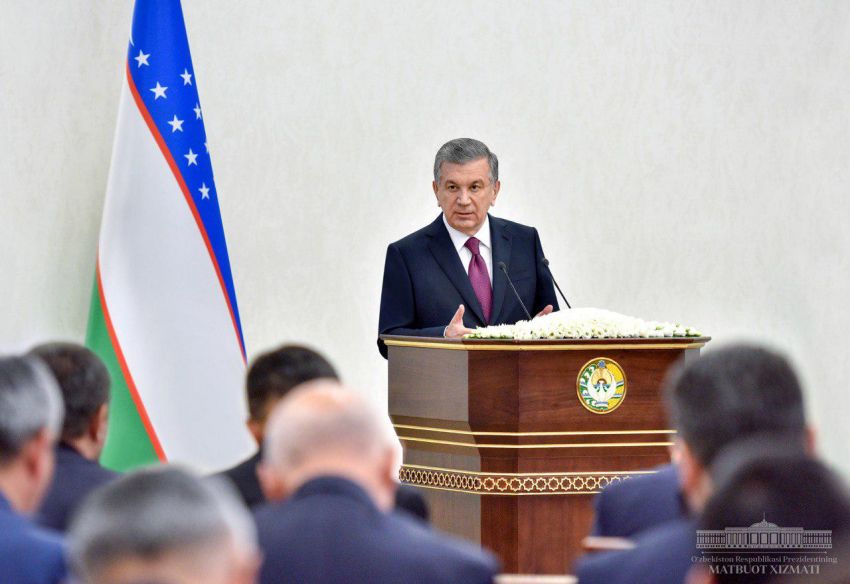
The Government portal of the
Republic of Uzbekistan
Untapped opportunities for execution of the state budget and development of entrepreneurship are defined
2019-11-07 | Politics
On November 7, President of the Republic of Uzbekistan Shavkat Mirziyoyev held a meeting devoted to implementation of forecast of revenues to the state budget, effectiveness of measures taken to identify and use additional opportunities for development of entrepreneurship and small business, as well as current tasks in this direction.

At present, entrepreneurs, small and medium-sized businesses are the pillar of sustainable economic development all over the world. In developed countries, business entities account for more than 90 percent of a total number of enterprises and employ more than 50 percent of the population. Thus, 71.7 percent of citizens in Japan, 69.3 percent in Germany, 53 percent in the United States work in medium and small businesses. In 2018, 76.3 percent of the population were employed in this sphere in Uzbekistan.
At the same time, business entities make a significant contribution to gross domestic product. In particular, in China it is 60 percent of GDP, in Germany – 57, in Singapore – 53, in the US and the UK – 52, in Japan – 51.6 percent. The share of this sector in Uzbekistan’s economy reaches 59.4 percent.
In Uzbekistan, development of entrepreneurship and small business is one of the main priorities of state policy. As President Shavkat Mirziyoyev noted, we can achieve progress and prosperity only through active entrepreneurship, tireless work and dedication.
As a result of fundamental reforms on supporting entrepreneurs and improving business environment in the World Bank’s Doing Business 2020 Ranking, Uzbekistan took the 69th place, rising by seven positions, and became one of the top 20 reformer states. For the first time, Uzbekistan has risen to the eighth place in the world for convenience of opening new enterprises.
Thanks to the opportunities created over the past ten months this year, 91 thousand new business subjects have been created, which is twice as much as in 2018.
However, much remains to be done for further development of the sphere.
Shortcomings identified in Doing Business 2020 report should be addressed, in particular, convenience of obtaining land, building permits and property registration should be improved.
In this regard, the need for providing land plots to entrepreneurs through an online auction, providing electronic data exchange between agencies for registration of property was noted at the meeting. It was proposed to organize, according to the international experience, a separate structure, independently carrying out state registration of the right to property.
In addition, as indicated at the meeting, khokims should allocate half of their working time to creation of new small business subjects, identification and practical assistance in solving entrepreneurs’ problems.
The President sharply criticized the indifferent and irresponsible attitude of many leaders to the issues of organization of new business entities and practical assistance to existing ones.
This is clearly evidenced by analysis of 26 thousand appeals received by the Reception Office of the Prime Minister of the Republic of Uzbekistan for considering entrepreneurs’ appeals. Despite the fact that 54 percent of these applications could be solved directly at the district level, inactivity of responsible officials forced citizens to apply to higher authorities. Most of such cases were recorded in Samarkand, Tashkent, Khorezm, Andijan, Jizzakh and Kashkadarya regions.
In this regard, khokims of all regions and districts were instructed to adopt an Appeal to entrepreneurs within two days, where they must personally guarantee entrepreneurs that they will not be hindered in the future, all leaders at places will provide them with close assistance and daily deal with issues concerning them.
The appeal aims to convey to our people the idea that all efforts will be thrown at assisting entrepreneurs. It should be announced in the media, social networks, placed on banners in crowded places. It is also necessary to indicate the phone numbers of khokims, heads of sectors and responsible departments.
In addition, territorial working groups need to go to places, properly organize work and solve problems of entrepreneurs.
As it is known, People’s Bank, Micro Credit Bank and Agro Bank were defined responsible for financing the state programs of development of entrepreneurship, resources were allocated for these needs.
Heads of these financial organizations and territorial working groups reported on measures taken to find and use new reserves in business sector.
A weak interaction was indicated between the Agency for Development of Small Business and Entrepreneurship, Reception Offices of the Prime Minister for consideration of entrepreneurs’ appeals, the Chamber of Commerce and Industry, Business Ombudsman, commercial banks and other authorized agencies.
All problematic issues concerning the sphere should be resolved in close cooperation of khokimiyats, Agency for Development of Small Business and Entrepreneurship, the Chamber of Commerce and Industry, Entrepreneurship Support Fund and banks.
The Head of the state noted that it is necessary to give a powerful impetus to activities carried out at places on creating new industries and establish a system of providing services with participation of entrepreneurs.
Today, production in 49 districts and services in 63 districts of the country are at a very low level. This indicates that their potential, land, raw materials and labor resources are not fully utilized.
Therefore, permanent working groups of the Ministry of Economy and Industry for Development of Industry and Services at places have been organized and assigned to branches.
These structures are instructed to study potential of each district and city, develop a program for creation of new capacities, infrastructure and service development for 2020. While implementing the program, it is important to sell almost 1.5 thousand objects of state property and with a state share, as well as restore the activities of 70 thousand entrepreneurs.
The State Customs Committee was instructed to establish the issuance of permits and certificates from January 1, 2020 for export-import operations in electronic form through single window customs information system.
Special working group led by Business Ombudsman pointed to the need for full commissioning of equipment worth 305 million USD, which was imported by entrepreneurs over the past three years, but was not used.
Tasks were also defined to further improve Uzbekistan’s position in Doing Business Ranking in 2020, in particular, simplify the system of issuing permits and certification.
Revenues to the state budget play an important role in sustainable development of the country and supporting social sphere.
The State Tax Committee was instructed to introduce a new system of full collection of taxes in November and December in Nukus, Andijan, Bukhara, Jizzakh, Karshi, Namangan, Samarkand, Fergana, Urgench, Kokand, as well as Zangiata, Gijduvan, Urgut, Khazorasp districts and 11 districts of Tashkent city, tax revenues in which do not correspond to their potential.
As it is known, together with International Monetary Fund, World Bank, foreign and domestic experts, a draft Tax Code was developed in new edition. From October 1, 2019, value added tax rate was reduced from 20 to 15 percent.
The next stage of reforms in tax policy is improvement of tax administration.
In this regard, the need for taking measures on preventing shadow activities and tax evasion, using modern methods and information technologies was noted. Roadmaps will be developed for all spheres to sharply reduce the shadow economy. In particular, a system of accurate VAT calculation will be introduced to combat tax evasion in construction industry.
In addition, it is necessary to control commissioning of 145 new large capacities, which should begin production this year and bring additional income to the state budget.
Payments for services rendered to population and legal entities play an important role in ensuring the sustainability of budget.
As previously reported, since 2020, the procedure for forming local budgets will radically change, regions will gain independence in making decisions on spending. In this regard, from now on, khokimiyats should create more small business and private entrepreneurship to increase local budget revenues, independently collect taxes. This will increase their responsibility.
Reports and proposals of khokims and responsible managers were heard on the issues discussed at the meeting.









